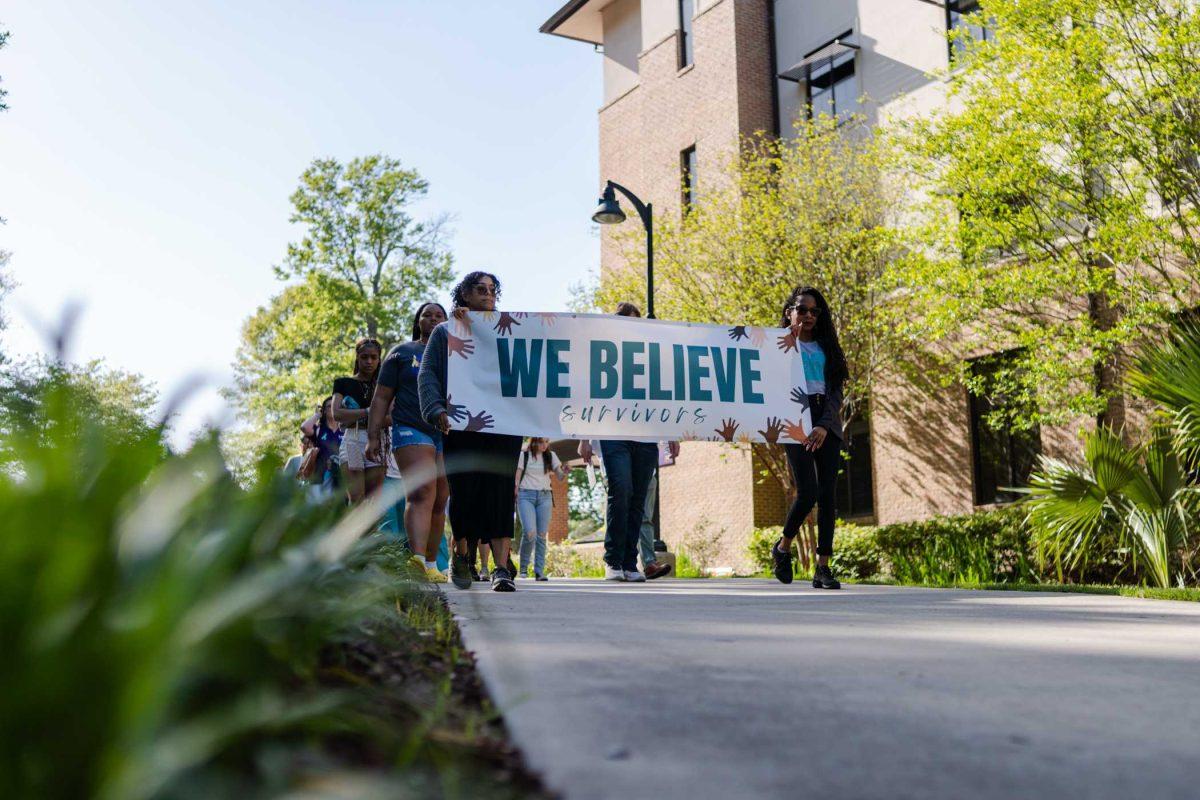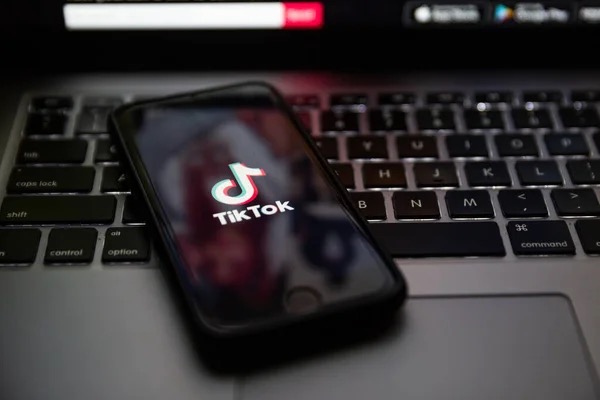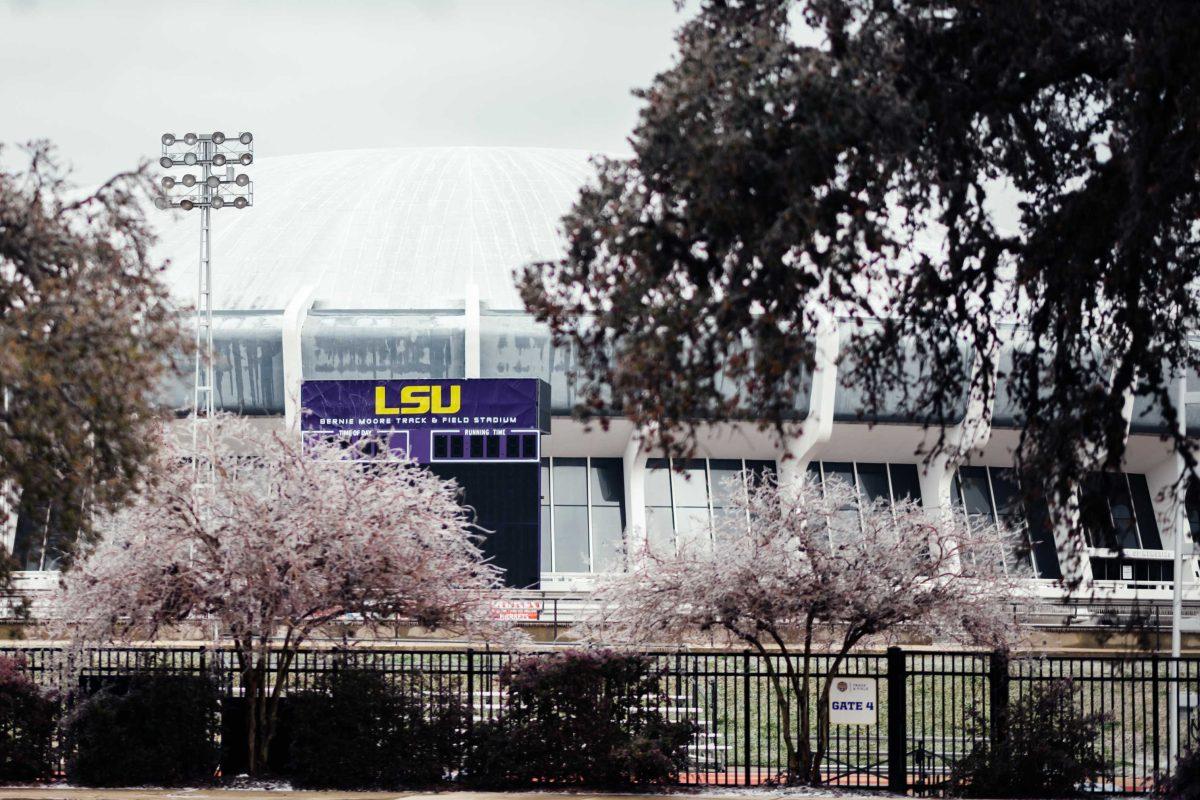April 2024 marks the 23rd anniversary of Sexual Assault Awareness Month, dedicated to awareness and prevention of sexual assault, harassment and abuse.
To start the month, LSU’s Office of Civil Rights & Title IX held its second annual SAAM Kickoff Event on Thursday. The office and organizations like the Student Health Center, Student Government and the Iris Domestic Violence Center met on Tower Drive to raise awareness and teach students about the resources available to them.
READ MORE: LSU settles Title IX lawsuit for $1.9 million
Microbiology sophomore Molly Dreznick attended the event. As SG’s assistant director of service, she volunteered with SG to pass out refreshments to students.
“It’s really important to highlight the voices that are often kind of diminished, or kind of dismissed,” Dreznick said.
Seeing the number of organizations that participated in the event demonstrated how much support there was for survivors in the Baton Rouge community, she added.
“Looking around at all of these tables, there’s a lot of organizations that care a lot about sexual assault awareness, and making a difference in the community,” Dreznick said.
John Michael Sweat, the Empower candidate for student body president, said raising awareness is why SAAM events are so important.
“They teach them about what resources are available, which is the most important thing, I think,” Sweat said. “Finding out what you have on campus to use to support yourself.”
Sweat, the current SG director of academic affairs, said sexual violence is an issue that will take collaborative efforts across campus to solve.
“It’s a big problem, especially in the South,” Sweat said. “… A lot of people don’t feel safe, especially on campus, and I think that’s an issue that we need to tackle with various types of resources and organizations working together to solve it.”
Sexual violence is a prominent issue in the U.S., with a sexual assault occurring every 68 seconds, according to the Rape, Abuse and Incest National Network. Over half of women and almost a third of men have experienced some form of sexual violence involving physical contact during their lifetime, according to findings from the Center for Disease Control and Prevention.
Many sexual assaults go unreported. Only about 5% of them, for example, are reported to police, a 2020 study from the Journal of Interpersonal Violence estimated.
At the event, some students said LSU should expand the Title IX office. Dreznick said the university could employ more people at the office and increase the awareness of confidential supporters on LSU’s campus.
Reporting from the Reveille has found many students don’t know what Title IX is or what the Title IX office does. After interviewing 10 randomly-selected students, the Reveille found four weren’t familiar with the office. Others knew little about Title IX and very few had a strong understanding of how the office functions.
Some who did know of Title IX said LSU should improve the office’s visibility on campus.
Biology sophomore Melanie Suarez said that she thought if the Title IX Office had a stronger social media presence, more students would be aware of who they are and the services they provide.
The Office of Civil Rights & Title IX is the primary resource on campus for survivors of sexual discrimination, misconduct and assault.
“Title IX works to provide a safe and supportive environment for students, faculty and staff who seek assistance with reporting incidents, supportive measures, learning more about processes and policies, or those who want to contribute to a positive learning environment,” the office’s website reads.
In the past, the office has struggled to uphold its mission.
An article from USA Today made waves on campus in 2020 when it revealed the Title IX Office failed to appropriately address reports of sexual assault and domestic violence. Ten female former LSU students sued the university over the issue.
The suit dragged for years. Then, in late March, the university settled by agreeing to pay the former students $1.9 million.
For Sexual Assault Awarness month, the office has several events planned.
The office will support the student organization Feminists in Action with the Take Back the Night event, on April 16, from 6 – 8:30 p.m. at Memorial Tower.
“[Take Back the Night] is one of the oldest violence prevention and awareness events that was started to support the mission of ending sexual violence in all forms by encouraging survivor stories and speak outs, providing resources and ending with a march and call to action,” Deputy Title IX Coordinator for Training and Prevention Miranda Brown and Deputy Title IX Coordinator for Response and Resolution Asha Murphy wrote in a message to the Reveille.
Title IX has also organized an event and social media campaign for the 25th anniversary of Denim Day on April 24 from 11 a.m. – 1 p.m. in Free Speech Alley.
Denim Day was started by the nonprofit Peace Over Violence after a ruling by the Italian Supreme Court overturned a rape conviction because the victim was wearing tight, denim jeans. There was implied consent, the court argued, because the victim must have helped the defendant take off the jeans. Peace Over Violence created Denim Day to shed light on the moral failure of victim-blaming.
Students who attend Title IX’s Denim Day event can contribute to a denim quilt to symbolize solidarity and support for victims of sexual assault. The Title IX office encourages students and staff to wear denim and share pictures of their outfits on social media.
While the Title IX office can help students report a sexual assault, some students aren’t sure if they want to make a formal report; on-campus confidential supporters can still provide support for those students. In fact, at the health center’s Lighthouse Program, all employees are confidential supporters, meaning they’re not required to file reports if a student tells them about a sexual assault.
Lighthouse works to support student survivors by connecting them with resources and helping them decide if they do or don’t want to make a report, Lighthouse Director Kreslyn Kelley-Ellis said.
Lighthouse can help gain academic flexibility for students who have experienced sexual violence, provide connections for temporary housing assistance and connect them to medical care and mental health services, either through the Student Health Center or off-campus providers.
Once students are established with the Lighthouse Program, all services related to their healing processes are free, including STI tests and evidence collection kits. Kelley-Ellis explained this is to protect student privacy.
“Because we are a confidential resource, we would never want parents to be flagged to know that this is going on if [students] don’t want them to know …” Kelley-Ellis said. “Once they are established with us, if they need that extended care, any service they need here in the Student Health Center we cover.”
The Lighthouse Program has been advocating for student survivors for more than two decades. Founded in 2000, the program was originally called “Men Against Violence at LSU,” The group formalized its structure in 2003, becoming the Sexual Assault Victim Advocacy Program. In 2013, this became the Lighthouse Program, which was restructured in 2021 to provide additional visibility and a formal connection to the Office of Civil Rights & Title IX, Kelley-Ellis said.
In anticipation of Sexual Assault Awareness Month, Lighthouse and the Student Health Center held a silent march through campus on March 26 to honor survivors.
“We want to let survivors know that they have a place to come and that we will believe them,” Kelley-Ellis said.
Since Kelley-Ellis started working at Lighthouse in September, she said, she’s seen the program’s impact. One way she’s tracked that impact is by calculating the retention — the number of students who reported assaults and remained enrolled at LSU — from fall 2023 to spring 2024.
Lighthouse measured a retention rate of almost 90%. That’s almost 15 points higher than the national average at 76.5%, Kelley-Ellis said.
“So many drop out of school, or just fail out of classes,” Kelley-Ellis said of student survivors. “But out of the students that came to us in the fall of 2023, 88.8% returned in the spring of 2024. And that’s why we’re here; we want to meet students’ needs, but we also want to keep them in school so they can continue with life and realize their dreams.”
In an exit survey Lighthouse asks students to complete, Kelley-Ellis said 95% of Lighthouse members from fall 2023 reported the program was “relevant in meeting their needs” when combining the “agree” and “strongly agree” options. The survey also found that 89% of students would return to Lighthouse again if they needed the services provided.
“To me, that speaks volumes about our impact, on top of the retention rate,” Kelley-Ellis said.
The Lighthouse director urged students who are seeking support to utilize the services the program can provide.
“We are here to help [students] disclose their trauma in a safe environment and to get them connected to the resources they need in order to live the life they want to live,” Kelley-Ellis said.
READ MORE: LSU Student Health Center hosts sexual assault survivors march throughout campus
Off-campus organizations will be emphasizing the importance of SAAM, too. Sexual Trauma Awareness and Response, also known as STAR, is a nonprofit that provides free supportive services to survivors of sexual violence throughout the state of Louisiana. STAR has three locations, including one branch on Corporate Boulevard in Baton Rouge.
STAR provides direct services, such as advocacy, counseling and legal representation to survivors. This includes constant support through a 24-hour hotline, as well as accompaniment to legal hearings and access to individual and group counseling sessions.
Behind advocacy, the second most used service is counseling, Counseling Director Carly J. Smith said. Smith’s clients range from having recently experienced sexual violence to working through experiences from years ago.
“STAR does have a waitlist for individual counseling just like, unfortunately, everywhere else,” Smith said.
Long wait times for mental health services have become increasingly common; according to research from the American Psychological Association, mental health counselors nationwide are struggling to meet growing demand.
“But having immediate access to that advocacy-type crisis intervention as well as the group counseling is really crucial,” Smith said.
STAR also focuses on achieving social change through community involvement and prevention education, Social Change Director Derrick Lathan said. Through his engagement with the community, Lathan spreads STAR’s message against sexual violence by teaching consent and how to recognize red flags and sexual pressure.
“I work with a high school to talk about healthy relationships, economic empowerment and other things that would intersect with sexual violence and sexual violence prevention,” Lathan said.
Lathan also has personal experience with LSU’s campus. He attended LSU for his bachelor’s degree and recently earned his doctorate exploring race, gender and education at the university. Lathan said his time at LSU had impacted the work he does at STAR.
“Being a student and a community partner at the same time, there’s a different level of investment that’s required in order to facilitate that …” Lathan said. “In my time in undergrad to now, I’ve been able to see the prevalence of sexual violence, how the university responds to it, how communities respond to it and what students articulate they need in order to feel safe on campus.”
He echoed the importance of believing survivors, as LSU’s Lighthouse Program does.
“One of the more powerful moments — it sounds small — is being believed and not being probed,” Lathan said. “It’s literally believing them, providing encouraging words, affirming the stories, affirming their decision with what they want to do with their stories.”
For SAAM, STAR’s Baton Rouge branch is hosting “All the STARs are Blooming,” a dinner with performances from drag stars at the East Baton Rouge River Center Library on April 13 to raise money for the organization and promote awareness and education. On April 25, STAR and other survivor groups will host Survivor Advocacy Day at the Capitol.
STAR works to bring positivity to the community through the services it offers and the events it holds. Lathan says positivity is important when dealing with the topic of sexual assault.
“Sometimes that requires us to do more fun things when we are talking about healing and empowering people,” Lathan said. “That doesn’t always have to be this doom and gloom thing. It’s important to us to make sure we are doing things that bring light to communities.”
Smith emphasized the importance of community in STAR’s work, explaining how being connected with the community is an important form of healing for survivors of sexual violence.
“It sort of circles back into healing as well because there is a place for individual therapy,” Smith said. “It’s, again, a really needed service. But then the healing that happens in a group or at a community space is just a very important aspect of healing, is that community aspect.”
Groups on LSU’s campus and around the state are working to teach and remind students of the importance of showing solidarity with survivors.
“Prevention starts with each person willing to find ways they can be better in their relationships,” Brown and Murphy wrote to the Reveille, “being prosocial bystanders that intervene when you witness something harmful or potentially harmful happening around you and by cultivating a community and culture of respect.”







